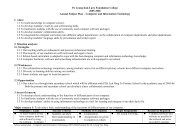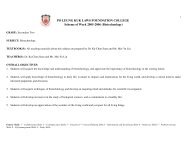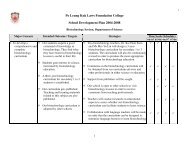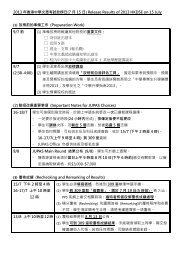Untitled
Untitled
Untitled
- No tags were found...
Create successful ePaper yourself
Turn your PDF publications into a flip-book with our unique Google optimized e-Paper software.
Lemon cell 4J Charles HuangWhen life gives you lemons, make a battery. Theaverage lemon usually lives a normal life of beingsqueezed for its sour juice every day. However, with alittle chemical knowledge, a normal lemon can actuallypower small everyday electrical appliances such as analarm clock.By connecting two metals of different reactivity toa lemon, such as aluminium and copper, the lemonturns into a weak battery.This is because the metal with the higher reactivity (alsocalled the anode), which in this case is aluminium, gives upelectrons more easily, while the metal with the lower reactivity (alsocalled the cathode), which in this case is copper, gives up electronsless easily. At the anode, Aluminium is oxidized into Aluminium ions,which are released into the lemon juice, and electrons are alsoreleased. The electrons then can flow along a wire to the cathode.As the electrons flow along the metal wire, an electrical current isproduced in the opposite direction. This electrical current can give asmall voltage, but when lemons are put in series, it can give outenough voltage to even power LED lights. While at the cathode,reduction occurs and electrons react with the hydrogen ions in thelemon juice to form hydrogen gas. The reason this reaction occursspecifically in lemons is because lemon juice is acidic as it containscitric acid, the citric acid acts as an electrolyte which allows the flowof ions and current which completes the circuit.Although a lemon cell can be a new and interesting way topower your alarm clock or any other small electrical appliances, butremember that there are leftover metal ions in the lemon juice afterusing it as a battery, so DO NOT try to eat or drink its juiceafterwards!Feedback from Dr. Tang Wing Suen:Our life is all about chemistry. We can develop new technology ordiscover new evidence through everyday observations andexperimentations. I really appreciate that you have mentioned thesafety precautions in your article.70





![Page 1 Page 2 Page 3 ããä¸çæ¯å¹³çãTheWorIdiSf]at)ã ä½è
湯馬 æ¯ ...](https://img.yumpu.com/49083939/1/184x260/page-1-page-2-page-3-aaacaeacatheworidisfata-a-1-2-eaee-ae-.jpg?quality=85)










